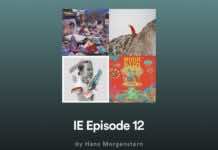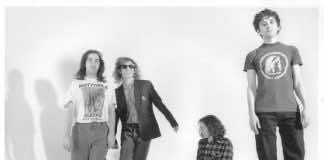 It was a longtime coming, but more than a year since poet Rick Holland shared his first step beyond his collaboration with Brian Eno (Old Man Diode brings poetry of Rick Holland into “disco” territory), his work with UK underground electronica artist Old Man Diode has finally resulted in a full-length album. The King Krill will see release as a digital-only release via the London-based indie label WW Music on March 26 (Support the Independent Ethos, purchase direct through Amazon via this link) … and on limited edition vinyl on April 25.
It was a longtime coming, but more than a year since poet Rick Holland shared his first step beyond his collaboration with Brian Eno (Old Man Diode brings poetry of Rick Holland into “disco” territory), his work with UK underground electronica artist Old Man Diode has finally resulted in a full-length album. The King Krill will see release as a digital-only release via the London-based indie label WW Music on March 26 (Support the Independent Ethos, purchase direct through Amazon via this link) … and on limited edition vinyl on April 25.
The album might seem more accessible compared with Holland’s work with Eno. Where Eno had chosen “vocalists” like a secretary to recite the lines on the Drums Between the Bells, vocalists on The King Krill bring often soulful, soaring voices to the mix. Notable UK artists on the album include Chris James (singer/keyboardist/guitarist for Stateless who most recently worked with Deadmau5) and vocalists Onallee (a collaborator with Roni Size), I Am Fya, Beth Rowley and multi-instrumentalist/vocalist Andrew Plummer. Still, even with more proper singing in the mix, Old Man Diode does not lean on the typical dance hall rhythms, choosing to explore more slippery beats inspired by such experimental electronica predecessors like Aphex Twin. For a limited time, you can listen to an exclusive stream of the whole album here (that’s a hyper-link).
As Holland and Old Man Diode (née Jo Wills) are in London, all three of us recently corresponded via email for a little question and answer session. They offer such beautiful insight into the care and approach to the music versus the words, the possibilities of interpretations and the creative process for the pure pleasure of experimenting and creating (Note: my questions are in bold, Holland’s responses are in plain text while Old Man Diode’s comments are in italics).
Hans Morgenstern: Rick, you wrote all the lyrics, correct?
Rick Holland: In some cases we wrote together, myself and the featured artist, so their ideas filtered through me, or fragments of our writing fused together.
HM: There is a dance quality to this record. Were you conscious of that when composing the lyrics used on the record?
RH: I always wrote to a beat-track, a skeleton of the track, and we wanted to keep the settings sparse and honest to their origin. I wrote from the instinctive response I had to Old Man Diode’s beats and bass pulses.
HM: What are some of the themes that you address in your words?
RH: These emerge after the writing. I’d like Jo to answer this one. There were powerful shared image banks for sure.
Old Man Diode: We didn’t have anything in mind at the start of writing, the starting point was wanting to collaborate, both of us (and the vocalists) talking and making and talking and making. In the end, the themes that have come through are about humanity really and the urban dichotomy of needing to be part of a group and an individual at the same time, trying to avoid becoming an automaton whilst seeing people being just that all around you. I think there’s a strong sense of being constantly being pulled in different directions, there’s beauty and desolation all around us. Maybe that feeling has come out through this strong oceanic vibe that infuses a lot of the writing. Somehow it’s part grimy concrete and barren cliff top at the same time.
RH: I like that. I would add that there are moments in there about being completely submerged and released, the ocean keeps coming back. And there is a love song in there too, an old-fashioned love lyric, but about shedding some of the more possessive elements of love.
HM: To what extent did the sound of Old Man Diode’s music influence your writing?
RH: It triggered and moulded the writing, it made it, in tracks such as “The King Krill.” “Clearing Song,” the words are the music passing through me, they are the music translated as instinctively as possible. In others, there is more input from my own life and experience, moulded to the atmosphere of the music.
OMD: Just to flip this question a bit and answer if from my perspective. I think we’ve both been influenced by each other and the process music I’ve written in the past has been very different to this. There’s a shared ethos in approach, a sort of minimalism that gives as much power as possible to each action. Also, one of the reasons I was keen to work with Rick was to make myself focus on words. My ears are drawn to texture when I’m listening. It’s hard for me to remember words in tracks I’ve just listened to or know really well. I hear them as part of the whole sonic, working with Rick has forced me to really focus on that content.
HM: Were you surprised by any results, the effects of the words turned musical? If so, where?
RH: I tended to listen to some of the work of a featured artist once I knew we were working with them, so in the writing process somewhere hidden in my back brain would have been an imagining of how that artist would sing the words, and whether they would “work.” Beyond that, though, all of them surprised me because they are all creative artists and all brought their interpretations to the process.
For some, the words took centre stage, for others they were more sounds to riff from, I love both approaches. Some less fluid “lyrics” on a page became beautiful through the artist, Chris James sliding over words springs to mind, and Onallee singing “Time hangs, like a torn sheet, we disappear through hopes” (OMD: is this not just in your head?!?!?!?!?!)* which may have started out as “holes,” but that lyric is just pure poetry for me, how it is sung, it could mean so many things to so many people.
OMD: It’s been great to see the words take shape, become melodies and textures. Sometimes it’s had a more operatic/libretto approach to setting and others have been more like writing a pop song with everything in between. Everyone has been great to work with, bringing their approaches and philosophies to the table.
RH: *quite probably, it’ll be what’s printed on the back of the vinyl though… haaa… and I prefer it.
HM: Rick, how much of a say did you have in the music that accompanied certain words?
RH: We have such an understanding of each other from years of working together and a shared sensibility that we usually just know when words and music were meant for each other, and this extends to production ideas too. We share ideas throughout the writing process, and our best work usually happens without over thinking. Luckily, we find effective ways to communicate in real time in the studio and most of the time we find the ground we both believe in.
OMD: Hahaha, some pretty funny ways of communicating as I remember, using words to describe sounds and vice versa. The best parts of the writing process have been when all three of us (Rick, myself and whoever’s singing) are in the room together, creating on the fly, everyone is influencing everyone else, that’s a real buzz, and the track comes pouring out.
HM: The vocalists vary a lot. Where did they come from?
RH: Wonderful mixture isn’t it? They are all just open-minded, creative artists drawn together by Old Man Diode’s vision and his life. There were a couple more surprising names interested in collaborating, we may hear from them later. This has been a dream team. They are all real artists.
HM: How different is working with OMD versus Eno (Eno collaborator/poet Rick Holland corresponds on craft – An Indie Ethos exclusive [Part 1 of 2])?
RH: This is such an interesting question. There are some huge similarities. Both believe in giving ideas space to become something without over complicating, yet both have some deep-lying beliefs in essential values of production. Both are constantly curious about their crafts and open to the input of other people.  Both come up against their limitations from time to time yet accept and find new ways to circumvent them. Both believe very passionately in the fruits of good collaborative practice. Both remove the ‘I’ from the process.
Both come up against their limitations from time to time yet accept and find new ways to circumvent them. Both believe very passionately in the fruits of good collaborative practice. Both remove the ‘I’ from the process.
In terms of less wooly specifics, it is different working with OMD because I grew from the same cultures and have a far more similarly mapped life to each other. Occasionally, with Eno, I would inadvertently suggest something that he felt he had covered before, or the essence of an idea would change entirely over time. I was in my early 20s when Drums Between the Bells started out, and early 30s when it was released. It was a really unusual process to turn that great a span of life into an album, fascinating and difficult all at once. With this album, Jo and I managed to finish it in just over two years (I think) and it is the shared work of two people in a more shared single world I think, less patchwork.
I could write a book about this question to be honest. Interestingly, I also think Eno may have taken some direct influence from this project, listening to some of his new work with James Blake, so the two subconciouses have certainly melded, feedback both ways.










